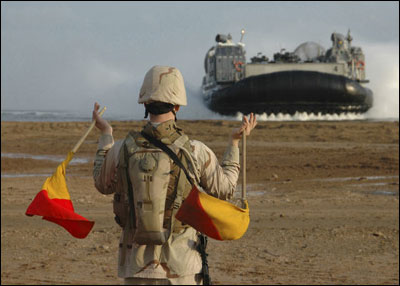Does Africa need AfriCom?

US goes to Africa
In April 2007 a US delegation led by Pentagon under-secretary Ryan Henry was on tour through Africa to promote AfriCom. They visited Senegal, Ghana, Ethiopia, Nigeria and South Africa. The delegation comprised officials from the Pentagon and USAID.
Meanwhile Ryan Henry is on tour again, this time he is visiting Algeria, Morocco, Libya and Egypt. Algeria and Libya have already snubbed the US plan for Africom on 11th and 14th June repectively.
Oil, Strategic Philanthropy and fight against Terror
Articles from US journalists like Greg Reeson, make the public believe, that the command’s main purpose is the fight against terror and AlQaeda. A bit on the agenda as well are partnerships and the implementation of humanitarian projects.
However the in -depth analysis of Sandra Barnes, Professor of Anthropology and founding director of the African Studies Center at the University of Pennsylvania, titled “Global Flows: Terror Oil and Strategic Philanthropy” arrives at completely different conclusions. Barnes, after analysing the US policy concludes, that the interests of the US in Africa are oil, minerals and markets, and, but not only, the fight against terror.
25% of worldwide production to the US.
Even though only 5% of the world’s population, the US consumes 25% of the world’s production of oil. The hunger for oil seems to be insatiable. 18% of US oil imports are already originating from Africa. The target for the near future is 25%.
The main exporters are Nigeria, Angola, Equatorial Guinea and Gabon in this order. However oil imports from countries like Nigeria are constantly under threat. The local population, not benefiting from the oil wealth, has, however, to carry the burden of the massive air and soil pollution in the Niger delta. Some groups have resorted to armed struggle to make their demands heard. Blowing up of oil pipelines and kidnapping of employees of oil companies has become rather a day-to-day event.
China enters the stage
The second largest importer of Oil is now the Peoples Republic of China, which was an oil exporter until 1992.Last year China’s oil imports increased by 31 % China is now a serious competitor for the US. China’s interests in Africa, however, go well beyond the importation of crude oil.
China has become over the last 20 years Africa’s third largest trading partner behind the US and France and well ahead of former colonial power Britain. Moreover China has no past as colonial power. To the contrary. Not forgotten in Africa is the construction of the Tazara Railway (Uhuru-Railway) from Dar-es-Salaam, Tanzania, to the Copper Belt in Zambia, 1850 kilometres long. China offered help, after the World Bank refused to fund the project.
Tens of thousands of Chinese workers and engineers constructed and finished the railway line ahead of schedule in the 60s and 70s, when China itself was a poor developing country at that time. According to a three year plan, unveiled on the China-Africa Forum in Beijing in November 2006, which was also attended by President Festus Mogae, China will double it’s aid to Africa to 1 billion by 2009, will provide 3 billion US Dollars in preferential loans, and train 15,000 African professionals as well as cancel all interest free loans, that matured in 2005 for the least developed African nations, amongst others.
Chinese companies have started to produce oil in Southern Sudan. Angola is meanwhile exporting more oil to China than Saudi Arabia does. The US government sees the best answer to all the problems in the built up of military bases in Africa. Or, as US General Wald said
“Id like to have some forward bases in Africa. The World has changed and we are going to make our own security. The halcyon days are over”
5 Billion of Investment
More than 5 billion US Dollars have been invested by Oil companies in the Golf of Guinea during the last 10years. The disagreement in the US administration, how to deal best with the securing the investment, fighting off the Chines competitor and dealing with international terrorists, between the Foreign Ministry, which proposed a combined effort including humanitarian, diplomatic and military components and the Pentagon, which focuses mainly on military aid has been decided by US President Bush for now. It’s the army and military aid that matters for them.
The British newspaper GUARDIAN commented that the establishment of AfriCom reflects the Bush’s administration’s primary reliance on the use of force to pursue it’s strategic interests. As a result AfriCom will militarise American relations with Africa and militarise numerous African countries. It will also tilt these countries’ policies towards the use of force and create more militants opposed to US military bases in their country or region.
Does Africa need this? Certainly not
sfux - 15. Jun, 09:19 Article 13254x read
















































